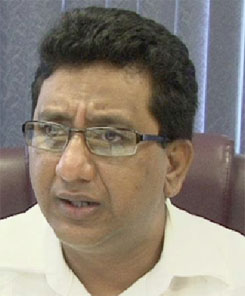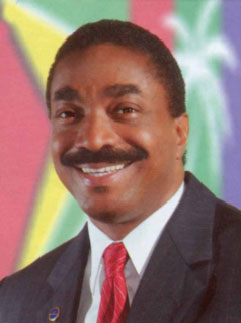An amendment to the Evidence Act, passed on Thursday in Parliament, will now make it easier for mothers in paternity disputes to prove their case in a court of law as well as speed up the presentation of evidence in other matters.
The Evidence Amendment Bill 2013, which amends the Evidence Act and paves the way for an expansion of the categories of experts whose certificates, analyses, reports or any form of certification of diagnosis can be admissible in a court of law, was passed unanimously.

One of the categories of experts referred to in the amendment is those certified to analyze human blood.
Paternity can be proven via a simple blood test—samples from a child and the alleged father are taken and then compared. Stabroek News affirmed yesterday that such a test can be done at the Eureka Medical Laboratory for varying prices. Persons wanting the test for personal use, can have one done for $70,000, while those wishing to have the test done for court purposes will pay $90,000.
Minister of Legal Affairs Anil Nandlall, who brought the Bill for its second and third readings on Thursday, said that single mothers have been hard pressed to prove the paternity of children and men continue to shun their responsibilities and refuse to pay child support. With the new law, he said, a simple test will make it easier for paternity to be proven.
This Bill is one of three passed on Thursday as the government moves to improve domestic security and legal policies in Guyana, and Nandlall says he expects its provisions to greatly enhance the justice system.
He explained that the need for the amendment was made apparent by the advancements made in the technological field and government’s realization of the wide array of new possibilities these advancements offer. Noting that technological improvements show no sign of slowing down the minister said government expects that further amendments will be warranted from time to time.
The Amendments
The Bill “seeks to enlarge the documents to which Section 43 of the Evidence Act applies to include a certificate or report signed by an analyst who has examined or analyzed: a firearm, a poisonous substance or human blood, bone or tissue and a certificate issued by the Police Forensic Laboratory.”
It also “enlarges the category of analysts to include an analyst of the Guyana Police Force or other qualified person.”

Documents that will be admissible once the amendments are implemented include “a post-mortem [examination] report of a duly registered medical practitioner; a report made by a duly registered medical practitioner within 48 hours of his examination of any injury received or the condition of a person which is the subject of a prosecution of a criminal offence.”
Under the new law, criminal and civil courts will also be required to accept “a certificate or report signed or purported to be signed by an analyst stating that he has analyzed or examined a fingerprint; a firearm or ammunition; a poisonous and noxious substance; a firearm or ammunition; a local or foreign currency; human blood, bones or tissues; or fuel or fuel based substance, and the results or his analysis or examination.”
Certificates issued by the Police Forensic Laboratory which bear the signature of an analyst of the Guyana Police Force will also be admissible in a court of law under the amendment.
The Bill also specified that the expression “analyst,” refers to “a government analyst, an assistant government analyst, a radiologist, a government bacteriologist and pathologist, a scientific officer of the Guyana Police Force or any other qualified person that the minister may by order prescribe.”
A Partnership for National Unity (APNU) MP and point person on legal affairs Basil Williams said that the coalition, as well as the criminal court system will welcome the amendments since the potential exists for the trials to be dealt with much faster. Williams, who is a prominent criminal and civil lawyer, added though that government must remain vigilant as past efforts to speed up the functioning of Guyana’s backlogged court system had yielded less than preferable results.
Jury trials, Williams explained, still take a long time before they are completed, and he added that some people are made to wait years before their matters are dealt with finally. He also spoke of legislation introduced in 2008 which was supposed to reduce the time taken before a matter is determined. Unfortunately, Williams said, this is not happening as anticipated.
Integrity of analysts
When Alliance for Change (AFC) Leader Khemraj Ramjattan spoke it was clear that he welcomed the amendments, but had concerns about the integrity of the persons who will be certified to sign documents which will serve as evidence. Ramjattan, who is also a prominent and longtime criminal and civil rights attorney, said such analysts should be “without blemish and unassailable,” seeing that their signatures can contribute significantly to the outcome of a case.
Ramjattan noted that while the amendment can bring a lot of good, “it can also create some serious injustice.
For an example of how such documents can be used, he pointed to Health Minister Dr Bheri Ramsaran’s citation of a medical report suggesting Colwyn Harding’s medical issues may be as a result of complications following surgery for hernia, and not police brutality as is being alleged.
Harding was allegedly ill-treated at the hands of police officers, one of whom reportedly sodomised him with a condom strapped baton. The incident is said to have damaged Harding’s insides. On Thursday though, Ramsaran said that a report signed by certified doctors revealed that the man’s medical condition may not have necessarily been caused by baton rape.
Ramjattan said the minister’s use of a report signed by doctors to disprove claims that Harding’s injury occurred as a result of baton rape was a potent example of why the character of such analysts must be unquestionable. He said the possibility of persons intentionally rendering inaccurate information as evidence was very much a possibility. However, he did not say this was the case in the cited instance.





